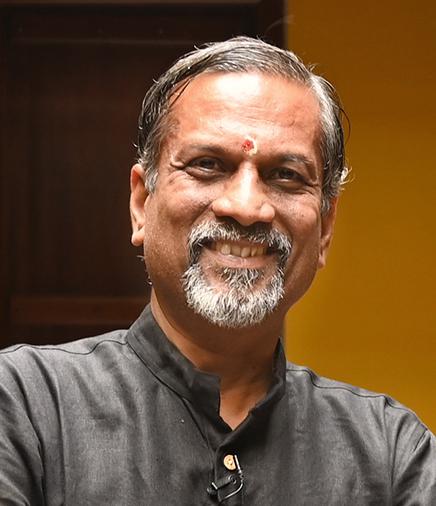

Zoho will not go for IPO and will stay private: Sridhar Vembu
interview
Amidst the picturesque backdrop of lush green agricultural fields and mountains in the remote Govindapperi village of Tenkasi in Tamil Nadu, the traditional and colourful house of Zoho’s co-founder and CEO, Sridhar Vembu, will surprise visitors. After returning from the US five years ago, Vembu made this village his home and has been running his $1 billion-plus company, which has nearly 12,000 employees. Clad in a dhoti and black kurta with Zoho’s new logo on it, the 55-year-old Vembu spoke tobusinesslineat his home andoffice on why the company prefers to remain private and on many other issues, including the ‘flawed’ central bank policies that hurt the technology sector. Excerpts:
Technology companies, including SaaS (software as a service) firms, are not doing well and have even laid off many employees. What’s your view on this trend?
Let’s first look at why the layoffs are happening. It was unleashed because of the central bank’s policies, particularly during the Covid. Even before the Quantitative Easing policies of the Federal Bank, the European Central Bank and the Bank of Japan, all of them pursued expansionary monetary policies that created asset bubbles, massive stock and real estate bubbles, and venture capital flow. The venture capital (VC) flow, in turn, funded the start-ups and created unicorns, but the sad part was that most of them lost millions and billions of dollars and still sported fancy valuations. Then the money dried up because inflation rose, and they had to cut back on the money supply.
This caused the end of the boom. During that bubble, particularly the late bubble period, because of the elevated growth rate that everybody experienced, including Zoho, many companies went on a hiring spree, doubled in size, and grew 60–70 per cent of their headcount in just two years.
There was extremely rapid expansion.
Now that the money has dried up, suddenly the growth stopped and layoffs happened.
How did Zoho manage?
We never overspent on marketing. During the boom, we accepted a lower growth rate than competition. We accepted that there is a necessary price for keeping our marketing expenses under control. We are winning the highest number of customers ever in our history, even during the boom. This is remarkable.
Can you quantify?
We now have 650,000 customers globally. We think we will reach a million customers in the next 12–15 months. This will be incredible. The pace quickened in the past 12–15 months, even during this economic disruption. This is quite impressive—that we have attractive, value-conscious clients globally. Our geographic customer presence is impressive. Our concentration of revenue in the US and Europe is one of the lowest in the SaaS industry.
Do you still feel that not chasing the VC money helped you?
It has worked well for us, and we will stick with that model. For us, it has given us freedom. For example, during this downturn, we can say that we can forego the profit, being willing to suffer an erosion in profitability and even an erosion in growth so that we can protect our employees and not do layoffs. This is the kind of choice that public companies and deep funded companies cannot make.
Did you lose customers during the downturn as they tried to cut costs?
Some of it could have happened, but we were able to power our way to growth, as we are still gaining a lot of customers.
But, on a global level, we still have a long way to go. We are only at $1 billion plus now. We think we can be worth $10 billion, and even then we would have a 10X or $100 billion opportunity. There is a long road ahead for us.
What sort of growth?
We are ahead of $1 billion now. We are still growing at 14 to 15 per cent per year, and we think we can accelerate the growth if the economic conditions are moderately ok. The rest of it, we cannot forecast. We can only control our execution. What the global economy offers, we cannot forecast.
Why do you say India is the hottest market?
For us, India gives the fastest growth rate. It is already our third-largest market for us in terms of revenue.
This is impressive as ten years ago, India was barely in the top ten with 2–3 per cent. We don’t disclose the break-even number, but India, in three years, will definitely overtake the EU to become number two in terms of revenue. All of it is also linked to India’s GDP growth and booming exports, which fuel our growth as exporters need CRM systems or other digital transformation solutions to effectively engage with the world. We are there to help them.
Are you profitable?
We don’t disclose numbers, but yes, we are a profitable company.
We have grown substantially. We are liquid, and we run a healthy balance sheet and don’t carry any debt. This gives us the confidence to power through the downturn.
How has attrition of employees been?
We did not have high attrition even during the boom, which has dropped now to 3.5 per cent to 4 per cent from 7.5 per cent to 8 per cent.
Even during the bubble, it was not very bad for us. Attrition is no longer a worry for us.
With over $1 billion in revenue and a large employee base, will you go for an IPO?
No. We will stay private.
The writer was in Tenkasi
at the invitation of Zoho
We now have 650,000 customers globally. We think we will reach a million customers in the next 12–15 months
Sridhar Vembu
co-founder and CEO
Zoho